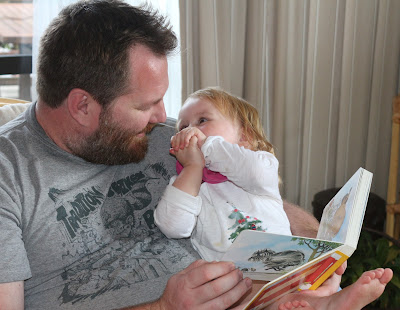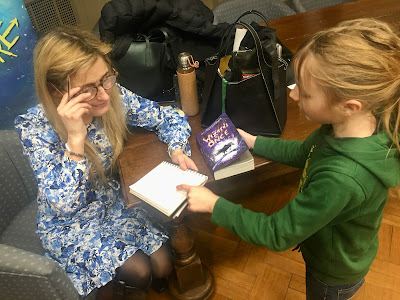 |
| Watching Cressida Cowell talk about storytelling and creativity onstage during the Oxford Literary Festival late last month |
Kia ora and gidday everyone.
Do you remember the first books you read and really loved, and why?
That's a question I've asked more than 230 authors over the years as part of a 'quickfire' 9mm interview series I ran on my Crime Watch blog since 2009. (I've also chatted about the same topic onstage and off with authors and other booklovers at festivals and events over the years.) Chances are, for many of us lifelong booklovers those first memorable reads will often be children's books of some kind.
For the crime writers I've interviewed, the likes of The Hardy Boys and Nancy Drew mysteries regularly crop up - as you'd expect for those of us who love mysteries - or Enid Blyton's Famous Five, or books like Black Beauty or the Swallows and Amazon series. I spend a good amount of time around keen readers, and for so many of us our passion for books began when we were kids, stoked by our parents, our teachers and schools, our local libraries etc.
Sometimes however, when we talk about books and book recommendations and 'best of the years'- whether online or in the pages of newspapers and magazines, those who write for younger readers are overlooked. They're a massive and vital part of the books and reading ecosystem, but kids and YA authors perhaps go under-appreciated at times.
When I was writing my own first book, Southern Cross Crime, a readers' guide to Australian and New Zealand crime fiction, I made a choice to break away from the books in that series that had gone before (eg titles delving into Nordic or British or European or American crime fiction) by including kids and YA crime and mystery fiction.
As I said in the introduction, I'd gone my own way a bit by including:
"some examples of crime and mystery writing for younger readers. I fell in love with mystery fiction by reading the Hardy Boys and Enid Blyton tales as well as Sherlock Holmes and Hercule Poirot as a youngster. Anyone who encourages kids to develop a love of reading, who opens those early doors to a whole world of learning and stories and imagination and possibility, is a rock star in my books. So, there’s no way I was going to write a book that didn’t include some of them."
For me, children's authors are rock stars. That's been underlined for me in recent years when I've seen the delight and wonder and so many other good things conjured in my own daughter (now 8 years old) through reading. She loves stories and storytelling, and because of her I now probably read 40% crime fiction, 50% kids books (with and to her), and 10% other things. Whereas before her birth it was 80%+ crime fiction and the rest other adult reads like biography, memoir and other fiction.
 |
| One of my favourite 'Daughter & Dad' times: reading books like Hairy Maclary to an absolutely delighted then Miss Nearly 2. |
Revisiting some old favourites like Roald Dahl and Tolkien and CS Lewis and Hairy Maclary with her, as well as discovering a whole new range of picture books and chapter books, has been wonderful. Back in 2017, I wrote a piece about the joy of kids reading for The Sapling, a New Zealand online publication that focuses on kids books.
While a good chunk of my reading in recent years has been kids books, from the picture book likes of Shifty McGifty and Slippery Sam or Zog or The Worst Princess or My Granny is a Pirate! (the latter by the Queen of Crime, Val McDermid), among dozens and hundreds of others, to chapter books by Roald Dahl and Robin Stevens and Cressida Cowell and others, almost all of my writing about books has remained focused on adult reading, usually crime/thriller titles and authors. I may change that going forward as I adore kids books and kids authors and all they do for the reading ecosystem and thereby bettering our world. I will still keep writing about great crime and thriller novels, but I will also find ways to give more coverage to kids and YA authors in various outlets too.
For me, there's a real magic in kids books. And a whole lot of skill and talent. To capture the imagination of little kids, who are often easily distracted or bored, takes real talent. To create something that is not only riveting on first read, but over and over and over and over again through regular re-reads, well that's next-level when it's done well. While the word counts may be far less and the words used less complex, the ideas and themes and stories are rich and powerful and thought-provoking and laugh-generating, and more.
Anyone who thinks it might be far 'easier' to write a great kids book compared to a great story for adults would be, to me, fooling themselves on many fronts.
.png) |
| Award-winning kids author Maria Gill uses creative non-fiction to share inspiring true-life stories with children and young people |
Recently, I've started interviewing kids authors, along with crime and thriller writers. It's something I plan to continue, moving forward. Earlier this year I had a feature on award-winning New Zealand children's author Maria Gill, who writes creative non-fiction picture books for kids, published in the weekend magazine insert to my home country's biggest newspaper. My first 'kids author feature' for them after dozens of books features over the years - usually crime novelists.
Last month I also took Miss Now-Eight to the city of dreaming spires, Oxford, to see and maybe meet a couple of kids authors, past Children's Laureates Michael Morpurgo and Cressida Cowell. The Oxford Literary Festival is a wonderful event, full of terrific panels and talks ranging all across the books spectrum. Some cool crime writers were there, including Val McDermid, and Mick Herron, as well as fellow Kiwi Eleanor Catton (Booker Prize winner) talking about her new thriller Birnam Wood.
But Miss Eight and I were there for the kids author events. It was a refreshing change (don't worry, I'll be attending plenty of crime events the rest of the year, including Harrogate and Bloody Scotland).
We really enjoyed both talks, with Michael Morpurgo sharing stories of how he got started, where he gets his ideas and inspiration (eg The War Horse was sparked by a conversation with an old soldier in a rural English pub, and Michael's curiosity to learn more about what the soldier had mentioned about horses going to war), his love of nature and the countryside, and the power of curiosity and persistence.
 |
| Miss Eight sharing her own story ideas with Children's Laureate Cressida Cowell, who was brilliant in giving feedback and encouragement |
Cressida Cowell was also brilliant, sharing how drawing is important to her creative process, how she uses maps to inspire ideas, and various other tips for budding young storytellers. Miss Eight was entranced and inspired, and we stood in line for 90 minutes afterwards to get a book signed by Cressida (Michael was unable to sign due to a shoulder injury). It was worth the wait, as Cressida took a good amount of time with each child, and when our turn came, she encouraged Miss Eight's story ideas, answered her questions, and posed for photos with her as well as signing books and her story map.
As I said in Southern Cross Crime, kids authors are rock stars.
What are some of your fondest memories of reading when you were a child, or reading with your own children? Do you have some favourite books or authors? Do you still read kids books as an adult?
Until next time. Ka kite anō.
Whakataukī of the fortnight:
Inspired by Zoe and her 'word of the week', I'll be ending my fortnightly posts by sharing a whakataukī (Māori proverb), a pithy and poetic thought to mull on as we go through life.
Poipoia te Kakano kia puawai
(Nurture the seed and it will grow)
















No comments:
Post a Comment